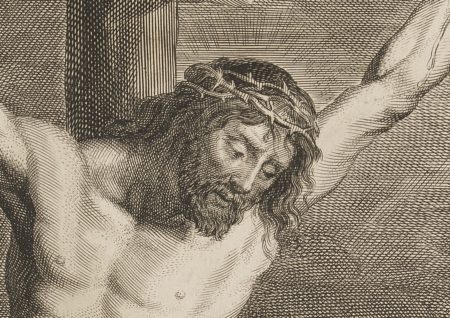Podcast: Play in new window | Download
Subscribe: Spotify | Email | RSS
In this episode congregationalist minister Noah Worcester searches the Bible for various senses in which one person may be said to “die for” another or “bear” the sin, sorrow, sickness, or reproach of another. He also notices this Old Testament law:
Parents shall not be put to death for their children, nor shall children be put to death for their parents; only for their own crimes may persons be put to death. (Deuteronomy 24:16, NRSV)
 He also focuses on what the New Testament authors explicitly say about the meaning of Jesus’ death, such as:
He also focuses on what the New Testament authors explicitly say about the meaning of Jesus’ death, such as:
For while we were still weak, at the right time Christ died for the ungodly. Indeed, rarely will anyone die for a righteous person—though perhaps for a good person someone might actually dare to die. But God proves his love for us in that while we still were sinners Christ died for us. (Romans 5:6-8, NRSV)
Worcester does not find any reason to accept a “penal substitution” theory of atonement, on which God’s holiness requires him to punish someone in order to forgive, so that Jesus takes the punishment due us, cooling off God’s wrath, enabling him to forgive. But he does find evidence that according to the New Testament, Jesus’ sacrifice was a demonstration of God’s love for us.
In my view, Worcester doesn’t not fully bring out why, positively, Jesus “had to” die. But I think he does show how penal substitutionary theories go against the grain of scripture. Listen to Worcester’s discussion of the passages below, and see if you agree. [spp-tweet tweet=”Did Christ die in order to display God’s love for us, rather than his wrath towards us?”]
Links for this episode:
- podcast 196 – Noah Worcester on Atonement – Part 1

- Noah Worcester
- The Atoning Sacrifice, a Display of Love, not of Wrath (2nd ed. 1830)
- Genesis 26:9; 2 Samuel 18:33; John 11:50; 2 Chronicles 25:3-4; Deuteronomy 24:16; Ezekiel 18:20; John 15:30; Romans 5:6-8; Matthew 26:35; Romans 16:4; Matthew 20:27-28; John 10:15; Hebrews 2:10; John 3:16; Romans 8:32; Hebrews 2:9; 1 John 4:10; Isaiah 53:6; Matthew 8:17; Romans 15:1; Galatians 6:2; Hebrews 12:3; Hebrews 13:13; 2 Corinthians 4:10; Mark 10:45; John 3:14-15; Mark 12:1-9; Matthew 16:21; Luke 24:6-7; Matthew 25:14-30; Matthew 25:31-46; Acts 2:37-41; 1 Corinthians 2:2; Philippians 2:8; Exodus 33:18-19; Matthew 6:12; Matthew 6:14-15; Ephesians 4:32; Colossians 3:13; 1 John 2:2; Job 42:7-8; Ezekiel 18:32; Ezekiel 33:11; Romans 5:10; 2 Corinthians 5:18-19; Acts 9; Matthew 5:43-48; Romans 12:21; Romans 8:32; Romans 8:38-39.
- Isaac Watts
- a mini-course on atonement by Dr. Josh Thurow
- This week’s thinking music is “Pierre” by Hicham Chahidi.

Noah Worcester is correct. When the Bible states that Jesus died for our sins, it is not meant that He is a payment/substitute, but rather “because of” our sins.
Mat. 26:28 “For this is My blood of the new covenant, which is shed for many for the remission [lit. into deliverance] of sins.” The covenant delivers from sin because those who choose to enter the blood covenant initiated by Jesus must reject a sinful life. (See also Rom. 11:27)
Luke 22:29 The original text says, “And I am covenanting a covenant with you, according as My Father covenanted a kingdom to Me”. This is typically translated as “And I bestow upon you a kingdom, just as My Father bestowed one upon Me”, which is totally misleading. We are sub-let into the covenant between Jesus and His Father.
Jesus was faithful in all things, totally contrary to Adam. By his death a new blood covenant was initiated, along with a new law and new priesthood. God delegated to Him all that would have been Adam’s. Now as head/Firstborn of the sons of God, Jesus is our Lord/Master/Boss. Hebrews chapters 7-10.
God made Jesus His Firstborn, with all the legal rights as the senior son. Ps. 89:27, Rom. 8:29, Col. 1:15, 18, Heb. 1:6, 12:23, Rev. 1:5
Those who choose sonship will have their sins forgiven. Rom. 3:25
The senior son distributes the inheritance to his brothers (Rom. 8:14, 17), but this is based on the predetermined condition that they must become conformed to His image. Rom. 8:29.
Jn. 1:12: “But as many as received Him, to them He gave the right to become children of God, to those who believe in His name” NKJV (Through Jesus we are granted the privilege to become God’s children.)
Rom. 8:15-17 “For you did not receive the spirit of bondage again to fear, but you received the spirit of adoption by whom we cry out, “Abba, Father.” 16 The spirit himself bears witness with our spirit that we are children of God, 17 and if children, then heirs—heirs of God and joint heirs with Christ, if indeed we suffer with Him, that we may also be glorified together.”
Rom. 8:23 “Not only that, but we also who have the firstfruits of the spirit, even we ourselves groan within ourselves, eagerly waiting for the adoption, the redemption of our body.”
(Those who choose to have the spirit/breath/attitude of Jesus within them will refrain from sinning (1 Jn. 3:2-3) and instead will reflect Jesus and His God. These are adopted into the family through the covenant and hence will share in the inheritance.)
If Jesus had not died, there would have been no blood covenant and no new world order to institute in place of Adam’s broken order.
Atonement, then, is becoming aligned mentally and behaviorally with God by making His Son our boss/Master, which then enables Christ to grant us participation in and future benefits according to His covenant, as adopted sons of God, and brothers of Christ. Jesus’ death on the cross initiated the blood covenant that we may now join, but it requires that we reject a life of sin and live as He lived.
(A study of the topics of inheritance and covenant reveals an entire legal overlay on this issue, which is seldom seen, since most people have no interest in an earthly inheritance/kingdom, nor the covenant by which it is established.)
I have also seriously questioned the standard atonement teaching and have done some research. My conclusion for now is that the atonement is covenantal. Jesus said He was instituting a new covenant in His blood. Therefore, it is a blood covenant. It is not that this is a direct payment of any kind. Rather, Jesus’ faithfulness and sinlessness unto death, even death on a cross, qualified Him to be the second Adam, head of all those who seek to live by the spirit of God, and whom God pardons.
Kevin,
Hebrews does say (I’m paraphrasing) that a will is not in effect until the one who made it dies. Therefore not even the first covenant was established without blood. So Moses took the blood of lambs and goats and hyssop and sprinkled it on the everything and the people to initiate the covenant (which in Greek is the same word as “will”). But Jesus has initiated a better covenant by his own blood instead of by that of animals.
Kevin,
I’ve always been skeptical of the “substitution atonement” concept simply because it makes no sense for God Himself to require unconditional forgiveness of all the saints and then to take retribution on an innocent man (Jesus) for the benefit of Himself.
Rivers 🙂
Dale,
What would be your stance on why it was the Father’s will for Jesus to lay down his life? Is there a place where you have written about this subject more extensively? Would love to hear your thoughts.
Aaron,
Wouldn’t it have been on account of the Father’s “love” for the world (John 3:16)?
Rivers 🙂
Rivers,
Sure. But if Jesus wasn’t dying and taking people’s sins away then what’s the specific reason? Any one of us might love someone else but dying merely to prove it would be considered quite strange (to understate it) don’t you think? There is usually a sense of accomplishing something on behalf of man that he can’t accomplish on his own. Hebrews seems to indicate that there is something about the blood of Jesus which cleanses our conscience and results in our justified standing before God. Perhaps this is a start?
Aaron,
God’s law required a “kinsman” to be the redeemer (Leviticus 25:25). Therefore, Jesus was born of the same “flesh and blood” as the rest of the family of Abraham (Hebrews 2:14-16).
In order accomplish redemption from the sins committed until the first covenant (Hebrews 9:15), it was necessary to establish a second covenant (Hebrews 8:7) which required the shedding of blood (Hebrews 9:22). Thus, Jesus was given as “the Lamb of God who takes away the sins of the world” (John 1:29, 36) because “God loved the world” (John 3:16).
Rivers 🙂
Comments are closed.